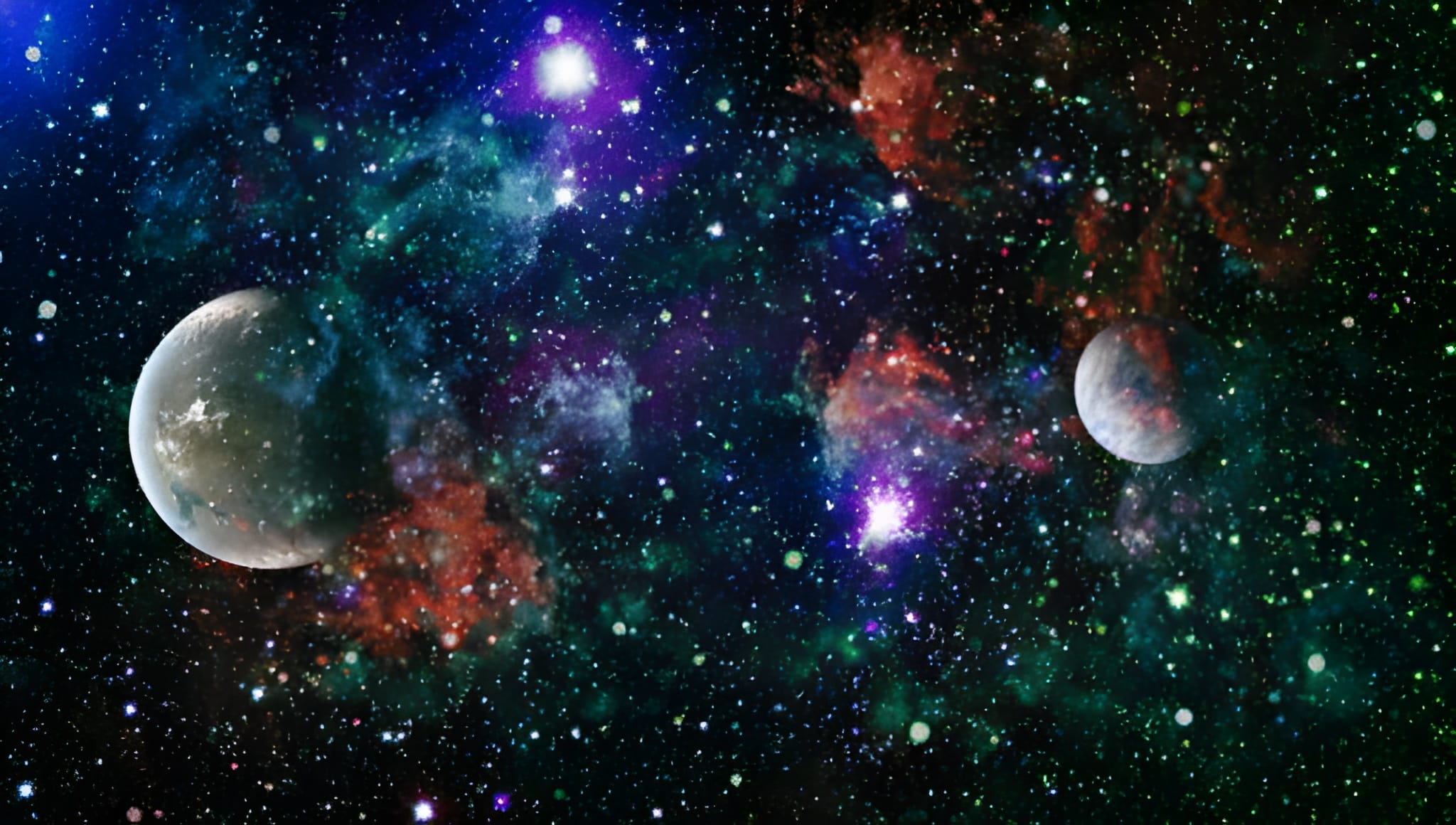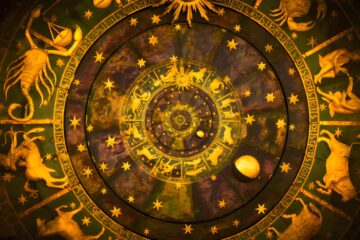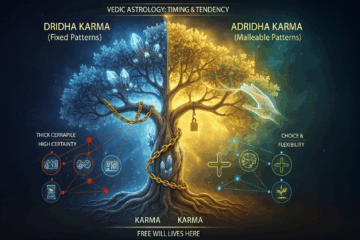Let’s address the awkward, intelligent question first: is Vedic astrology scientific, or is it just a cultural belief system we defend because it comforts us? If you’ve ever tried to explain Jyotish to a doctor, engineer, researcher, or just a sharp friend who lives in evidence-based reality, you’ve heard this challenge. And honestly, it’s a fair one.
The point of this article is not to oversell astrology or to hide behind “you just have to believe.” We are not doing that here. Real Jyotish — the one rooted in observation, dashas, divisional charts, and repeated testing — does not actually need belief to work. It needs data, clean birth details, and a mind trained to see patterns. That’s it.
So when we ask, “is Vedic astrology scientific?” the honest answer is: it is an observational, correlation-based discipline that sits between science and art. It is not physics; it is not tabloid horoscopes either. It’s closer to psychology, medicine, or weather modeling — fields where pattern recognition, probability, and practitioner maturity matter a lot.
What “Scientific” Really Means When We Talk About Jyotish
Most people who ask “is Vedic astrology scientific” are not actually asking about astronomy or math — they’re asking, “Can I trust this without surrendering my brain?” That’s a good instinct. In Jyotish we work with precise planetary longitudes, nakshatras, dashas, and divisional charts. That part is fully mathematical. Where it becomes interpretive is when we attach meaning to those positions.
Classical astrologers did exactly what scientists do: they observed the sky and its correlation with human events for centuries, kept what worked, dropped what didn’t, and codified repeatable rules. That’s why BPHS, Phaladeepika, and later writers keep emphasizing timing (dasha proposes, transit disposes), dignity (own/exaltation vs debility), and repetition across reference lagnas — because that’s what held up in practice.
So no, Jyotish is not “believe and it will work.” It is: “Watch long enough and it becomes obvious.” Which is a very different claim.
Astrology vs Science: Correlation, Not Causation
One reason people say “astrology isn’t scientific” is because we can’t prove a causal mechanism — Mars doesn’t send a red laser to your 7th house to ruin your marriage. But Jyotish never claimed a mechanical cause. It claimed synchronicity: when certain planetary configurations form, certain types of events tend to occur. That’s the heart of correlation not causation in astrology.
This is not unique to Jyotish. Psychology does this. Economics does this. Even medicine does this when it says, “People with this cluster of markers have higher risk of that outcome.” We accept that in medicine because we like the lab coat. We resist it in astrology because the data source is the sky.
The ancient rishis didn’t have to explain the mechanism — they only had to prove the rhythm. And over time, the rhythm stood. That’s why your Moon dasha feels like your Moon, your Saturn transit feels like Saturn, and your Rahu period externalizes desire. You can disbelieve it, and it will still show up. Reality doesn’t flinch.
Astrology Based on Observation: A Personal Science Experiment
For many of us (and yes, this is where the “Karanism” flavour shows up), Jyotish was not inherited through blind tradition — it was fought with, interrogated, and finally respected. Some of us grew up in logical, high-achieving households — doctors, lawyers, officers — where you don’t get to say “because I feel like it.” You get to say “because I tested it.” And when you test hundreds, then thousands of charts, and you keep seeing the same configurations deliver similar life events, you start to admit the obvious: this thing works.
That’s what we mean by astrology based on observation. You don’t have to believe. You have to watch.
- Track 20 charts where Saturn is transiting the native’s Moon (Sade Sati). Note what actually happens.
- Track 20 charts where Venus is the significator of marriage and its dasha activates. Note what actually happens.
- Track 20 charts where the dasha lord is badly combust in D1 but strong in Navamsa. Note the mixed results.
Do that for a year and your question changes from “is Vedic astrology scientific” to “why is this so internally consistent?”
Belief vs Evidence: Why We Don’t Lead With “Have Faith”
Belief is beautiful — it anchors the mind, shapes character, and often keeps people sane. But it can also harden into dogma. If we make Jyotish depend on belief, we trap it in that dogma. If we present it as a tested interpretive framework, we let it breathe. That’s healthier for the student and for the tradition.
In other words: Jyotish isn’t asking for worship. It’s asking for good note-taking. The more charts you see, the better you see the logic. That’s why every serious astrologer, at some point, says: “Keep a chart diary.” That is the scientific temperament in astrology — observe, compare, refine.
Where Astrology Stops and Belief Begins
Now, let’s be mature. Even if we answer “yes” to is Vedic astrology scientific, there are things it cannot and should not claim:
- It cannot override free will — dashas propose, you dispose.
- It cannot define subjective states like “happiness” with numerical precision.
- It cannot replace medical, legal, or psychological expertise.
- It cannot promise miracles through gemstones or rituals when the planet is functionally malefic for your lagna.
Those areas belong to belief, dharma, and personal spiritual practice. Jyotish can time your surgery window; it can’t fix a lifestyle you refuse to change. Jyotish can show your Saturn themes; it can’t do your Saturn work.
How to Test Jyotish Like a Scientist
If you really want to settle “is Vedic astrology scientific” for yourself, don’t argue it on Instagram. Test it. Here’s a simple framework:
- Collect accurate birth data. Within 1–2 minutes if possible. Without that, conclusions wobble.
- Note 5–7 major events (marriage, job, health, move, children).
- Check dasha–bhukti at those dates. See which planet was active.
- Check transits of Saturn, Jupiter, and nodes at those dates.
- Repeat across charts. Look for repetition — that’s your real teacher.
Do this across 50–100 charts and you will see why we keep saying: Jyotish is not about belief; it is about disciplined observation.
Important Notes
Is Vedic astrology scientific if it can’t prove causation?
Yes, because not all valid knowledge is causal. Jyotish is a correlation science. It maps repeating sky patterns to repeating life events. Many accepted disciplines work like this — epidemiology, behavioural economics, even parts of clinical medicine. Causation is gold standard; correlation is still useful when it is stable and testable.
Does astrology work without belief?
Yes. The chart doesn’t care whether you believe in it. If your Saturn mahadasha is activating your 10th house, career themes will rise. Belief matters more for how peacefully you experience the karma, not whether the karma shows up.
Is astrology superstition or science?
Superstition is untested fear. Jyotish is tested pattern. The problem is not the system — it’s when people apply it lazily, fatalistically, or commercially. Used properly, Jyotish is a structured, observation-first method of reading time.
How does this relate to divisional charts and dignities?
Exactly the same way. We observe that a planet strong in D1 and repeated in D9 delivers better. We observe that combust benefics protect less. And, we observe that upachaya houses improve with time. None of this is belief — it’s chart literacy.
FAQ
Can astrology ever be accepted by mainstream science?
Maybe — when science expands to include consciousness, synchronicity, and symbolic systems as legitimate variables. Right now astrology sits outside the lab but still inside the realm of repeatable human experience.
Why do skeptics fail to see astrology’s accuracy?
Because most skeptics test bad astrology — sun signs, no birth time, no dashas, no rectification. Jyotish needs precision. If the input is loose, the output looks random. That’s not a failure of the system; it’s a failure of setup.
Is it okay to be skeptical and still study Jyotish?
Not just okay — ideal. A scientific temperament in astrology makes your readings sharper and your remedies more sane. Question everything, but test everything too.
What if two astrologers give different answers?
Interpretive disciplines allow for different emphases. One may focus on dasha, another on transits, another on Jaimini. When the same theme repeats across methods, that’s your confirmation.
Keep Studying with Much Needed Astro
If this helped you explain — to yourself or to someone smarter-than-thou in your life — that Jyotish is an observational system and not blind belief, stay with Much Needed Astro. We teach the real thing: functional benefics vs natural benefics, D1 vs D9, dashas that actually match life, and a no-drama, no-fear approach to timing.
If you’re serious about studying real Jyotish, stay with Much Needed Astro — no fluff, no fear-mongering, just clarity you can actually use.




